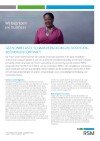The rules for determining the qualification of foreign entities/partnerships as transparent or non-transparent (opaque) in the Netherlands differ from international standards.
Under current Dutch rules it is first assessed whether the foreign entity has similar legal features to a Dutch legal form. If so, the foreign legal entity will typically be treated similarly for Dutch tax purposes as the comparable Dutch legal entity. This often leads to a different tax treatment (transparant vs non-transparent) in the Netherlands than in the foreign jurisdiction (hybrid mismatch) especially in case of foreign limited partnerships which are comparable to a Dutch limited partnership (CV).
Mismatches in the qualification of entities could lead to double deductions (“DD”) or a deduction without an inclusion (“D/NI”). To prevent this DD or the DD/NI outcome, the Netherlands has already introduced hybrid mismatch regulations (ATAD 2) per 1 January 2020, which should neutralize this effect, however do not take away the cause hereof.
In addition, interest and royalty payments (and as per January 2024 potentially also dividend payments) by Dutch taxpayers to hybrid entities could lead to the application of the conditional withholding tax on interest and royalties which was introduced January 1, 2021.
To reduce the number of mismatches through a difference in entity qualification as transparent or non-transparent between the Netherlands and foreign jurisdictions, it is proposed to amend the Dutch rules for the qualification of foreign entities and to align this with international standards.
By means of an internet consultation stakeholders are invited to provide comments on the proposed legislation by April 26, 2021. Below an overview of the proposed legislation.
Proposed legislation per 1 January 2022
The following is proposed to reduce the entity qualification mismatches between the Netherlands and foreign jurisdictions:
A: Dutch Limited Partnerships (CV) and Foreign Limited Partnerships comparable to a CV
Based on current Dutch tax laws a Dutch CV could qualify either as transparent or non-transparent entity for tax purposes depending on whether prior approval of all partners is required for the admission and substitution of limited partners. Currently, foreign entities that are comparable to CV’s (limited partnerships such as for example a GmbH and Co KG or Delaware LP) are often treated as non-transparent in the Netherlands as the admission and substitution of limited partners may typically take place without the prior consent of all partners.
Under the proposed law, a Dutch Limited Partnership (CV) will always be treated as a transparent entity for Dutch tax purposes1 and subsequently this entity should no longer be subject to Dutch corporate income tax. The underlying participants of the CV will generally become liable to either corporate or personal income tax in the Netherlands for their share in the CV. It is proposed that foreign limited partnerships that are comparable to the Dutch CV will also be treated as transparent for Dutch tax purposes.
1 Corporate income tax, dividend withholding tax and conditional withholding tax
B: Dutch Fund for Joint Account (FGR) and comparable foreign funds
Based on current Dutch tax laws a FGR could qualify either as transparent or non-transparent. If the participation rights in a FGR are transferable without the prior approval of all other participants a FGR is regarded as non-transparent.
Under the proposed legislation for a FGR to still qualify as a non-transparent entity for Dutch tax purposes, one of the following conditions should be met:
- The participations in the Dutch FGR are traded on a regulated stock exchange, or
- The Dutch FGR is regularly required and obliged to repurchase participations from its participants.
Kindly note that an exception is made for so-called family funds, these funds will become tax transparent under the current proposal.
C: Foreign entities incomparable to Dutch legal entities
For foreign entities of which no comparable Dutch equivalent exists, such as for example UK Limited Liability Partnership (LLP), Irish Unlimited Company (ULC) and German Kommanditgesellschaft Auf Aktien (KGaA), the following is proposed:
- Provided the foreign entity is incorporated under foreign law but considered a tax resident of the Netherlands, this entity will be considered non-transparent and subject to Dutch corporate income tax.
- Provided the foreign entity is incorporated under foreign law and established abroad, the qualification of the jurisdiction of establishment is followed.
Consequence of the change of tax qualification
The change from non-transparent to transparent for CV’s and comparable foreign entities leads to a deemed transfer at fair market value of the assets and liabilities of the CV to the respective partners at the time immediately preceding the qualification change. A number of options are proposed to mitigate any adverse tax consequences due to this deemed transfer such as a rollover facility and extensions of payments.
For Dutch FGR’s no measures are announced to mitigate the adverse tax consequences of the deemed transfer due to the change from non-transparent to transparent should the new requirements not be met.
Impact on existing structures
The purpose of amending the qualification rules is to decrease the hybrid mismatch situations that currently occur due to the derogation of the Netherlands from international concepts in this respect.
International structures that use non-transparent CV’s or a Dutch FGR should be reviewed.
In addition, holding structures using foreign entities that are now considered opaque due to the current entity classification but based on the proposed legislation might be regarded as transparent going forward should be reviewed on their effectiveness for dividend withholding tax purposes and non-resident corporate income taxation on capital gains.
In addition, the entity classification could impact the application of the Dutch participation exemption regime.
More information?
If you would like more information about the above, please contact your trusted RSM adviser.
Download 'Dutch foreign entity qualification rules to be amended' in pdf.

